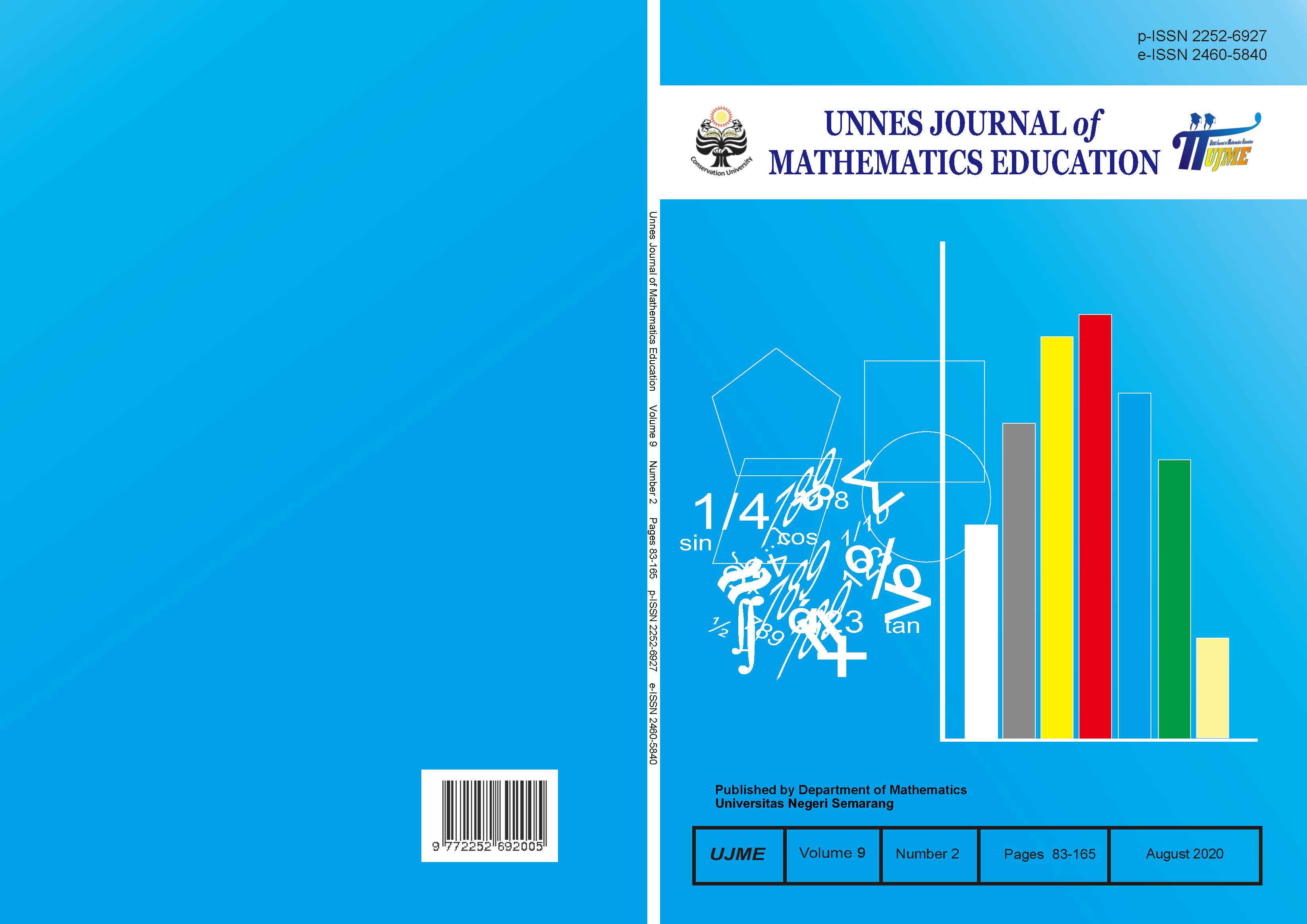Attitude towards problem-solving as the effect of problem-posing approach
##plugins.themes.academic_pro.article.main##
Abstract
This study aims to examine whether students’ achievement of attitude towards problem-solving by problem-posing approach better than by direct approach. This study was a quasi-experimental. The population was all students at Junior High School 8 Bandung, 8th-grade for a total of 8 classes, with two classes as the sample. The instrument used to get the data was a questionnaire with five indicators (patience, persistence, perseverance, willingness, and confidence). Data analysis was performed using the t-test and Mann-Whitney U. The results of this study revealed that overall the attitude of students towards problem-solving by problem-posing approach was not significantly better than by direct approach; more specifically, it was equally good, while for each indicator, the result was varied. Moreover, in the class of problem-posing approach, students had patience and persistence in solving problems that were more prominent than aspects of perseverance, willingness, and confidence.
##plugins.themes.academic_pro.article.details##
References
Cail, J., & Hwang, S. (2002). Generalized and generative thinking in US and Chinese students’ mathematical problem solving and problem posing. Journal of Mathematical Behavior, 21(4), 401–421. https://doi.org/10.1016/S0732-3123(02)00142-6
Ellerton, N. F. (2013). Engaging pre-service middle-school teacher-education students in mathematical problem posing: Development of an active learning framework. Educational Studies in Mathematics, 83(1), 87–101. https://doi.org/10.1007/s10649-012-9449-z
Guvercin, S., & Verbovskiy, V. (2014). The Effect of Problem Posing Tasks Used in Mathematics Instruction to Mathematics Academic Achievement and Attitudes Toward Mathematics. International Online Journal of Primary Education (IOJPE), 3(2), 59–65.
Isoda, M. (2010). Lesson study: Problem Solving Approaches in mathematics education as a Japanese experience. Procedia - Social and Behavioral Sciences, 8(5), 17–27. https://doi.org/10.1016/j.sbspro.2010.12.003
Labe, B. I. (2015). Student Teachers’ Self-Appraised Problem-Solving Ability and Willingness to Engage in Troubleshooting Activities. SAGE Open, 5(3). https://doi.org/10.1177/2158244015595257
Malaspina, U., Mallart, A., & Font, V. (2015). Development of teachers’ mathematical and didactic competencies by means of problem posing. Proceedings of the Ninth Congress of the European Society for Research in Mathematics Education, 2861–2866. https://hal.archives-ouvertes.fr/hal-01289630
Mata, M. de L., Monteiro, V., & Peixoto, F. (2012). Attitudes towards Mathematics: Effects of Individual, Motivational, and Social Support Factors. Child Development Research, 2012, 1–10. https://doi.org/10.1155/2012/876028
Mishra, P., & Koehler, M. J. (2006). Technological pedagogical content knowledge: A framework for teacher knowledge. In Teachers College Record. https://doi.org/10.1111/j.1467-9620.2006.00684.x
Mohd, N., & Tengku Mahmood, T. F. P. (2011). The effects of attitude towards problem solving in mathematics achievements. Australian Journal of Basic and Applied Sciences, 5(12), 1857–1862.
Zakaria, E., Haron, Z., & Daud, M. Y. (2004). The Reliability and Construct Validity of Scores on the Attitudes toward Problem Solving Scale. Journal of Science and Mathematics Education in Southeast Asia, 27(2), 81–91.
Zakaria, E., & Ngah, N. (2011). A preliminary analysis of students’ problem-posing ability and its relationship to attitudes towards problem solving. Research Journal of Applied Sciences, Engineering and Technology, 3(9), 866–870.
